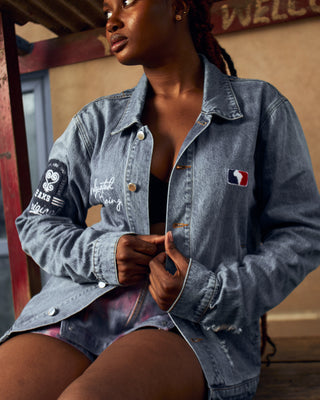Growing up, many of us had childhood ambitions but some of them changed along the way. That is not the case with Fadji Zaouna Maina, the first Nigerien scientist to work for the National Aeronautics and Space Administration (NASA). She has had ambitions of alleviating water problems in her hometown since age 10. Now, she gets to tackle the world’s water crises with data from NASA.
The 29-year-old hydrologist from Zinder, Niger, joined NASA on August 27, amid congratulatory messages from Niger’s president and first lady and other high-profile members of her community. Nigerien President Mahamadou Issoufou referred to her as “a national pride, and a role model for the youth of Niger”.
Her response to the president was befitting and it summarised her entire journey. “I pushed the boundaries, I made it possible and I made a whole country proud,” she said. “The chances for a girl like me, born and raised in Zinder (Niger), to become a scientist at a well-known institution like NASA are almost zero.”
She acknowledges the fact that the water crisis in Niger is deteriorating due to climate change. As a girl child in Zinder, having tap water in her home gave her an edge over other children, especially girls who had to go in search of water from the lake or buy from neighbors.
“People think that the boys should go to school or go to work and the girls should find water and come back [to do] cooking and cleaning,” Maina told Share America in an interview in September.
“[Girls] don’t have time to go to school,” she said. “Girls’ education is one more problem that comes from climate change — I have seen that.”
This situation fuels her ambition to succeed and she is giving it her all.
“I have a responsibility on my shoulders because I believe I need to show the face of my country,” Maina said. “It’s like changing the image of Nigeriens and changing the image of the women generally.”
Maina, at age 16, completed her secondary education, having been skipped several times ahead of her peers. She has been an advocate for education and girl child empowerment since she was a teenager, and, at one point, served as a junior deputy in Niger’s National Youth Assembly.
Maina went to The University of Fes in Morocco to pursue a degree in geological engineering. She then proceeded to the University of Strasbourg for her master’s in engineering and environmental sciences.
In 2016, she earned her Ph.D. in Hydrology from the University of Strasbourg, a field she chose in order “to participate in improving the conditions of access to drinking water in Niger,” according to The Africa report.
On a quest to find tangible solutions to the global water crisis, Maina worked in highly acclaimed laboratories such as the French Alternative Energies and Atomic Energy Commission (CEA) before joining the Energy Geosciences Division of the University of Berkeley in the United States.
It was her work at Berkeley that caught the attention of Forbes, earning her a spot on the Forbes’ 30 Under 30 2020 Science.
Later, she saw a job opening online at NASA and went for it. Today, she works as a computational hydrologist at NASA’s Goddard Space Flight Center where she uses mathematical models and remote-sensing products to study the impact of climate change on water, according to the Nigerien US embassy.
“I will try to better understand the water cycle and the evolution of water resources in the context of climate change by using mathematical models and data from NASA satellites,” Maina explained.
She continues to support girl child education and the emancipation of women in Niger. The young female scientist also advises young girls who aspire to be like her to keep pushing.
“I will say to them to not give up to keep going because everyone would think people from Niger, or a young girl from Niger, would not be able to do this. But just believe in yourself and find an environment that will support you,” she told.


